Acer Aspire V3-571G-9435: The Value Proposition
by Jarred Walton on July 4, 2012 4:25 AM ESTAcer V3-571G General Performance
We start as usual with our general performance application benchmarks. We still don’t have quite as many laptops available in our updated Mobile Benchmark Suite as we’d like, and there’s not much point in comparing a full-size notebook with several different models of Ultrabook. We’ve tried to stick with the more meaningful comparisons where possible, but we also wanted to flesh out the charts with additional data points. The result is the following selection of laptops, with their basic specs listed in the table, and as always, should you want to make additional comparisons, head over to Mobile Bench.
| Laptop Configuration Overview | ||||
| Laptop | CPU | Graphics | Storage | Battery |
| Acer Aspire V3-571G | Intel i7-3610QM | GT640M/HD4000 | HDD | 48Wh |
| Acer TimelineU M3 | Intel i7-2637M | GT640M/HD3000 | SSD | 55Wh |
| AMD Trinity Prototype | AMD A10-4600M | HD7660G | SSD | 56Wh |
| ASUS N56VM (Prerelease) | Intel i7-3720QM | GT630M/HD4000 | HDD | 56Wh |
| ASUS Zenbook Prime UX21A | Intel i7-3517U | HD4000 | SSD | 35Wh |
| ASUS G74SX-A2 | Intel i7-2630QM | GTX560M/HD3000 | SSD | 90Wh |
| Clevo W110ER | Intel i7-3720QM | GT650M/HD4000 | Hybrid | 62Wh |
| Razer Blade | Intel i7-2640M | GT555M/HD3000 | SSD | 60Wh |
| Sony VAIO SE | Intel i7-2640M | HD6630M/HD3000 | HDD | 49Wh |
| Toshiba P755D | AMD A8-3520M | HD6620G | HDD | 47Wh |
As we’re starting with PCMark results, we again want to note how much of an impact the presence of an SSD has on the results. It makes most of the comparisons between the HDD and SSD equipped laptops meaningless, but it does serve to drive home the point that for some workloads an SSD will make a huge difference. I switched over to a 240GB SSD for my laptop and Ultrabook use, and whenever I have to use and test a laptop that only has HDD storage (like the Acer V3), the difference is painfully obvious.
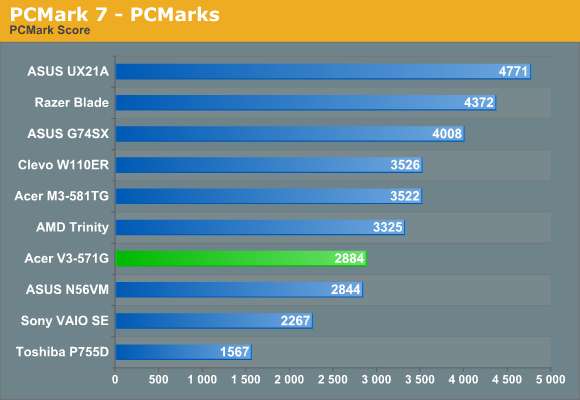
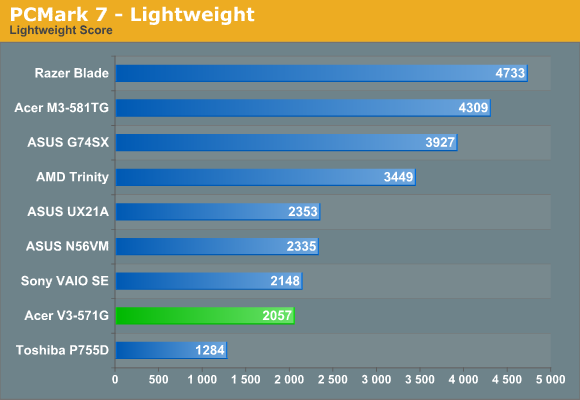
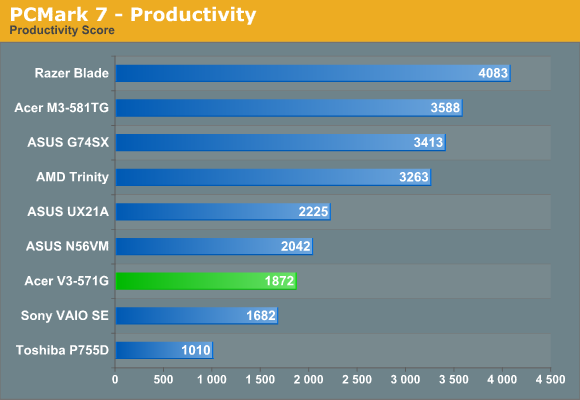
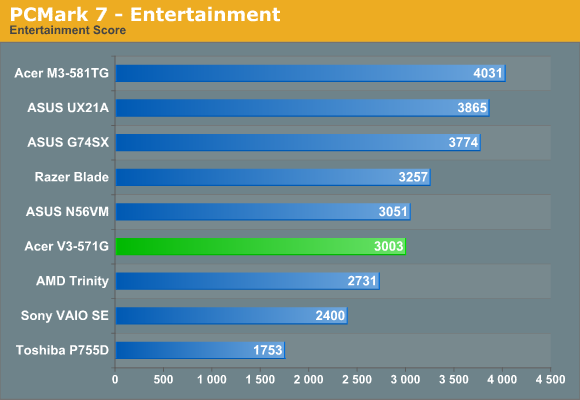
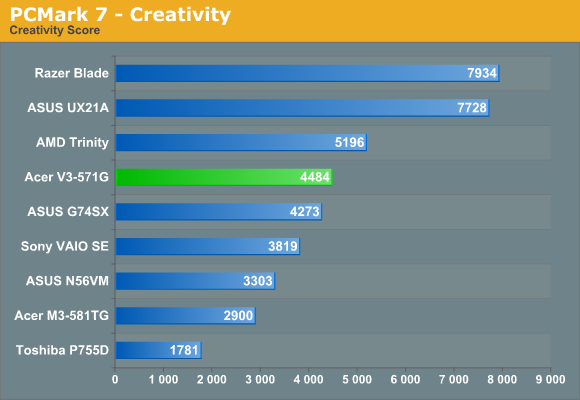
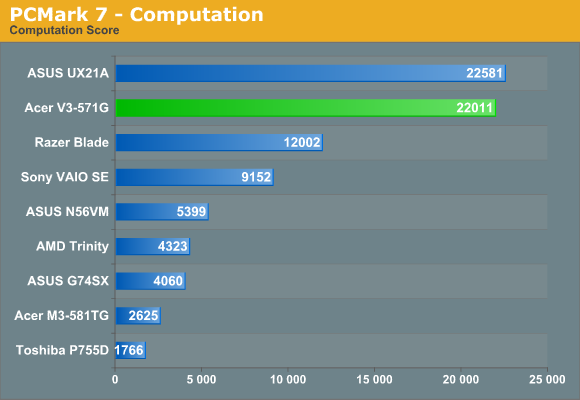
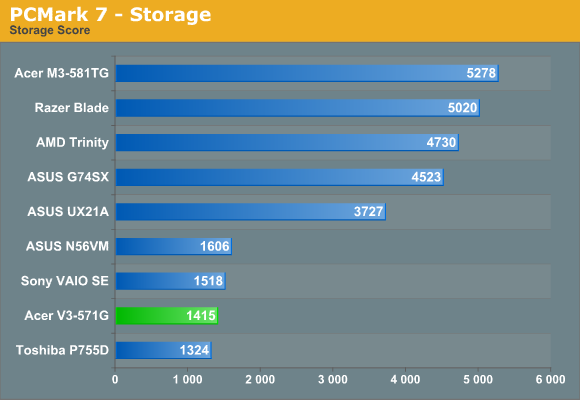
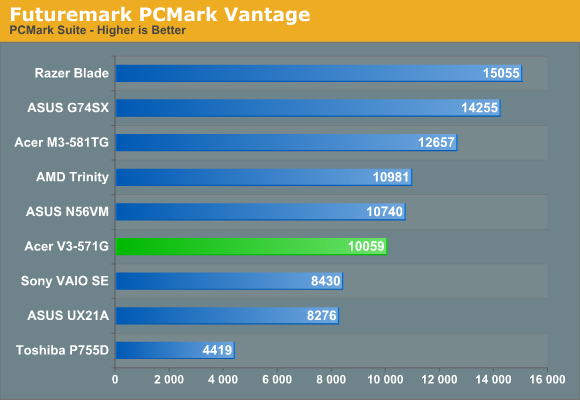
The placement of the Acer V3 in the above charts isn’t very inspiring, but remember what we said about SSDs. Most of the higher scoring laptops feature SSDs and/or slightly faster CPUs. For general use, any of the laptops will be “fast enough”, and as long as you don’t mind waiting during intense periods of disk activity (e.g. initial boot up of the OS and various applications) even the HDD equipped laptops will work well. Still, one look at what an SSD does for the ASUS N56VM might make you consider splurging on better storage system. Acer adds insult to injury here by going with a 5400RPM hard drive, and the only slower Storage score in the charts comes from the Toshiba P755D—which also uses a 5400RPM Toshiba hard drive, not surprisingly.
If we look at the one PCMark 7 test that doesn’t hit storage at all, the Computation suite, we run into a different problem. Here, all of the laptops that support Intel’s Quick Sync technology get a massive performance boost, and the Ivy Bridge processors are basically twice as fast with Quick Sync as Sandy Bridge parts. It makes for yet another lopsided graph, which makes the overall usefulness of the PCMark scores debatable. As long as we understand what the charts represent, however, we can at least use them to gauge relative performance. The basic summary is that, for general use, a moderate CPU (e.g. Trinity, Llano, or Sandy Bridge) with an SSD will offer a better experience than just about any current HDD-based laptop; similarly, if you want to do hardware accelerated video encoding, there’s no beating Quick Sync.
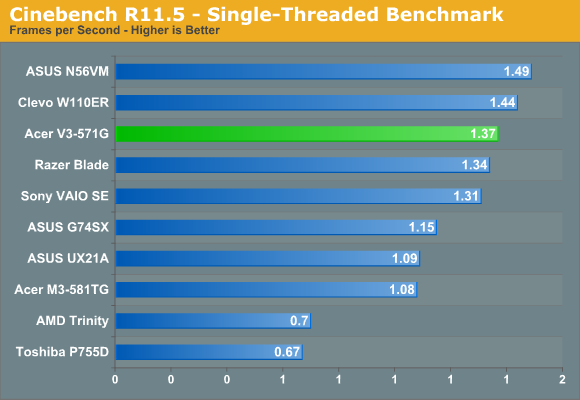
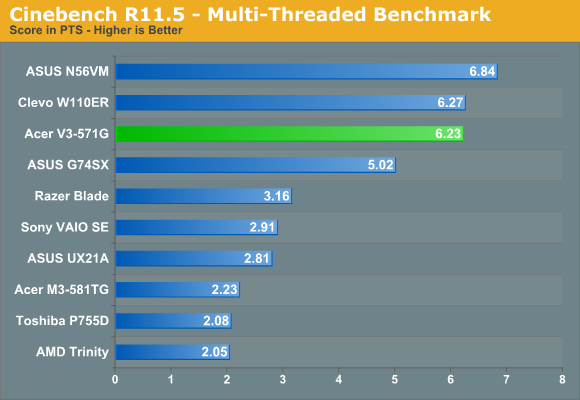
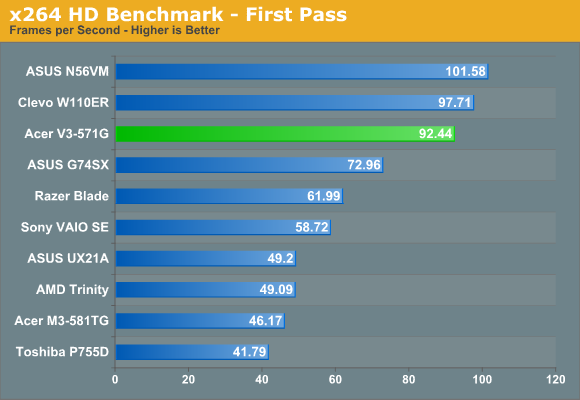
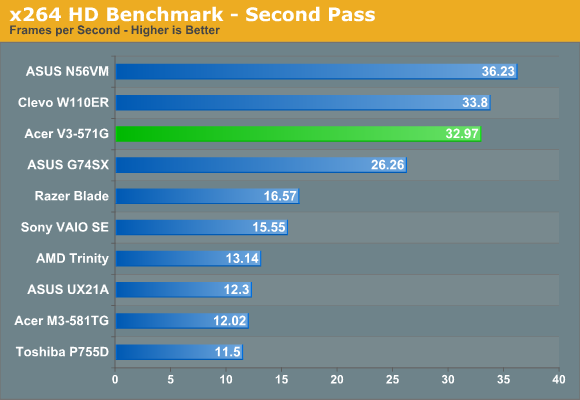
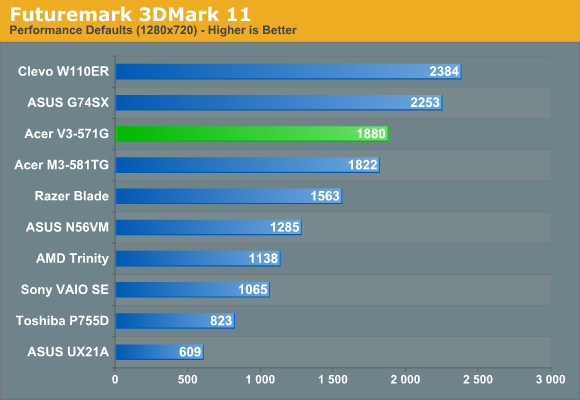
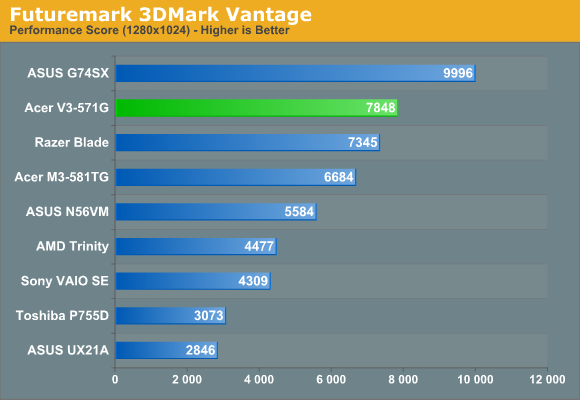
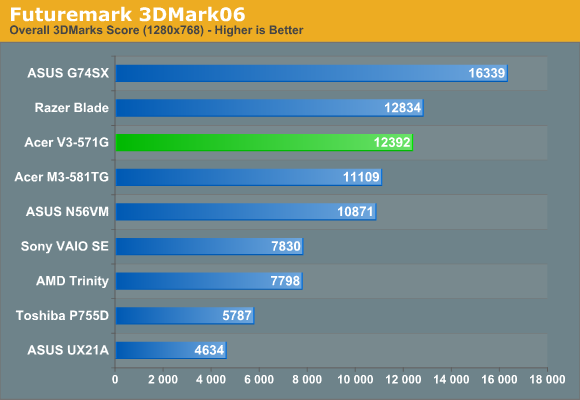
When we shift over to our more CPU- and GPU-centric tests, the performance results start to look more sensible. As one of two quad-core Ivy Bridge laptops, the Acer V3-571G takes second place in all four of our CPU-based tests, losing out by a small margin to the higher clocked i7-3720QM in the ASUS N56VM. The 3DMark scores tell a similar story, although this time it’s the GTX 560M in the ASUS G74SX that takes first place, with the GT 640M generally falling into second place and trading blows with the Razer Blade and Acer M3-581TG Ultrabook. The latter has the same GPU but a slower ULV Sandy Bridge processor, and we should hopefully have the updated M5 Ivy Bridge model in for testing in the near future.










88 Comments
View All Comments
weiran - Wednesday, July 4, 2012 - link
Terrible display ruins a laptop.You should refuse to review 15" laptops with a resolution more suited for an 11".
JarredWalton - Wednesday, July 4, 2012 - link
If we refused to review any laptop with a marginal display, we'd be stuck with about 10 to 15 laptop reviews per year -- and that's assuming we could even get all the good display laptops in for review. We would also forego reviews of any laptop that doesn't cost at least $1000. Needless to say, the volume of laptops sold for under $800 is probably an order of magnitude more than the volume of over $1000 laptops sold, so it's an important market to at least look at.duploxxx - Wednesday, July 4, 2012 - link
no one in this budget needs that quad core horse power. Acer would be better of spending the wasted money on build quality or better screen.Penti - Wednesday, July 4, 2012 - link
On the other hand GT 640M wouldn't drive a high-res screen at native resolution. In games that is. But I'm quiet appalled that we can have chassis like this in the Ultrabook and starting configurations for business notebooks price range. Even if you don't have the best displays, or the budget to do all like a super nice case you should at least have a good touchpad and keyboard. Something like a Acer TimelineU M5 wouldn't be more expensive either. So I'm note sure what they are thinking it looks to be a much better notebook, you don't need quadcore notebooks for gaming, the trackpad looks to be better (if they don't fail at it, looks to be a cheap variant on the V3 though) at the M5 and it also comes in a 14" variant.A 2kg dualcore notebook for 800 with GT 640M should be well enough here, and does look better then this. But you loose 1GB of VRAM as well as that quadcore. Yet this doesn't look like a 800 dollar notebook from today and I think it's time to leave the plastic gamer ~800-1000 dollar notebooks behind and let compal and Clevo come up with better computers to fill that need for the OEM's or for them to take the market more seriously and design something decent themselves. Mobile gpus for mid-end performance for gaming obviously exist for half decent power and price range. I thought Acer was trying to clean up their act and please kill all the packard and gateway branding too. Those might have filled up a space in the early 90's, but it's not something you like to remember. Lots of similar stuff isn't the right thing here, if you still like to have budget lineups they will need to be more differentiated from high end models. They should still be decent enough for those that don't like to spend 800-1000 or more too.
JarredWalton - Wednesday, July 4, 2012 - link
Statements like this are so arrogant. "No one in this budget needs that quad core CPU." Really? Who made you the determiner of what every person needs? I know a lot of poor college and high school students that would like to be able to have access to more than just basic dual-core processors. Following your logic, we end up back with the old "640K should be enough for anything" mentality of the DOS era. While most people don't need and won't use the processing power of a quad-core CPU, to say that no one needs it is very narrow minded.bupkus - Wednesday, July 4, 2012 - link
I know a lot of poor college and high school students that would like to be able to have access to more than just basic dual-core processors.Good, but the question is, "can they afford it"?
We have promised to buy a nephew a notebook and had anticipated to pay no more than $500. Now I'm wondering what we can get that will allow this high school grad to do school work and just not even try to provide him gaming or media capabilities.
For that purpose a good monitor seems more significant than an i7 processor. We hope we can find just such a notebook with perhaps a dual core Sandy Bridge processor and even a decent keyboard. Intel HD 3000 display will do just fine. Only the resolution needs a little upgrade.
JarredWalton - Wednesday, July 4, 2012 - link
Obviously there's no single answer to what's most important, but For many of the components, whatever you buy with your laptop is going to be what you're stuck with until you buy a new laptop. If you buy a laptop that doesn't have a discrete GPU, it will generally be inadequate for gaming. You have a better chance of upgrading the display (see the LCD testing section where I discuss what's required) than you have of adding a discrete GPU to a laptop that doesn't come with one. Even swapping out CPUs can be a bit tricky, as you have the potential for locked down BIOS firmware that refuses to support anything besides a couple specific CPUs.Anyway, while I understand that many parents might find the lack of graphics hardware a benefit, if your son/daughter/nephew/niece/etc. ends up not liking the laptop and taking out a student loan to go buy a laptop that they do want, you've wasted money. This definitely happens, as I knew quite a few people back when I was in school that spent $1500+ from their student loans on a new PC that they "needed" for their studies. Of course, I was a CS major so they really did need a computer of some form, but I'm not so sure the 3dfx Voodoo cards were required hardware....
jabber - Wednesday, July 4, 2012 - link
True, however, if you keep reviewing these inferior screens then they will still keep coming.If you said to the manufacturers "No sorry but we consider that spec to be obsolete/inferior to what our users want to buy!" then the message may get across that things have to change.
If you only review 15 laptops a year so what? They are more likely to be ones your readers want to buy after all.
Plenty of other stuff to review than crappy screened laptops after all.
retrospooty - Wednesday, July 4, 2012 - link
"True, however, if you keep reviewing these inferior screens then they will still keep coming. If you said to the manufacturers "No sorry but we consider that spec to be obsolete/inferior to what our users want to buy!" then the message may get across that things have to change"I agree in theory, but the root cause is the issue. Having a site or two or several say that wont change anything. Manufacturers will keep making it as long as people keep buying it.
At least today there are alot more 1600x900 and 1920x1080 options in 13,14 and 15 inch laptops than there has been for the past 3 years. It's starting to shift to higher res.
JarredWalton - Wednesday, July 4, 2012 - link
Exactly. I love how I'm supposed to refuse to review laptops that 90% of people I know outside of AnandTech will buy, and in turn only review hardware that 10% or less of people I know will use. And AnandTech should apparently also only cater to the enthusiasts, rather than trying to build our audience.Articles like this can get noticed by the semi-technical readers that are researching a laptop, and they might end up saying, "Wow, there's a ton of information in that review that I can't find elsewhere. If they think this laptop is fast but cheap -- in price as well as quality -- what do they recommend as an alternative? Maybe I should read more...." We have the potential to increase knowledge as well as readership with mainstream articles like this.
It's always important to see what's going on in the budget oriented market segment when evaluating higher end offerings. I should have a few higher quality (and higher price) laptops in for review shortly, some with good/great screens and some with more of this 1366x768 nonsense.